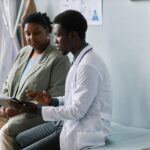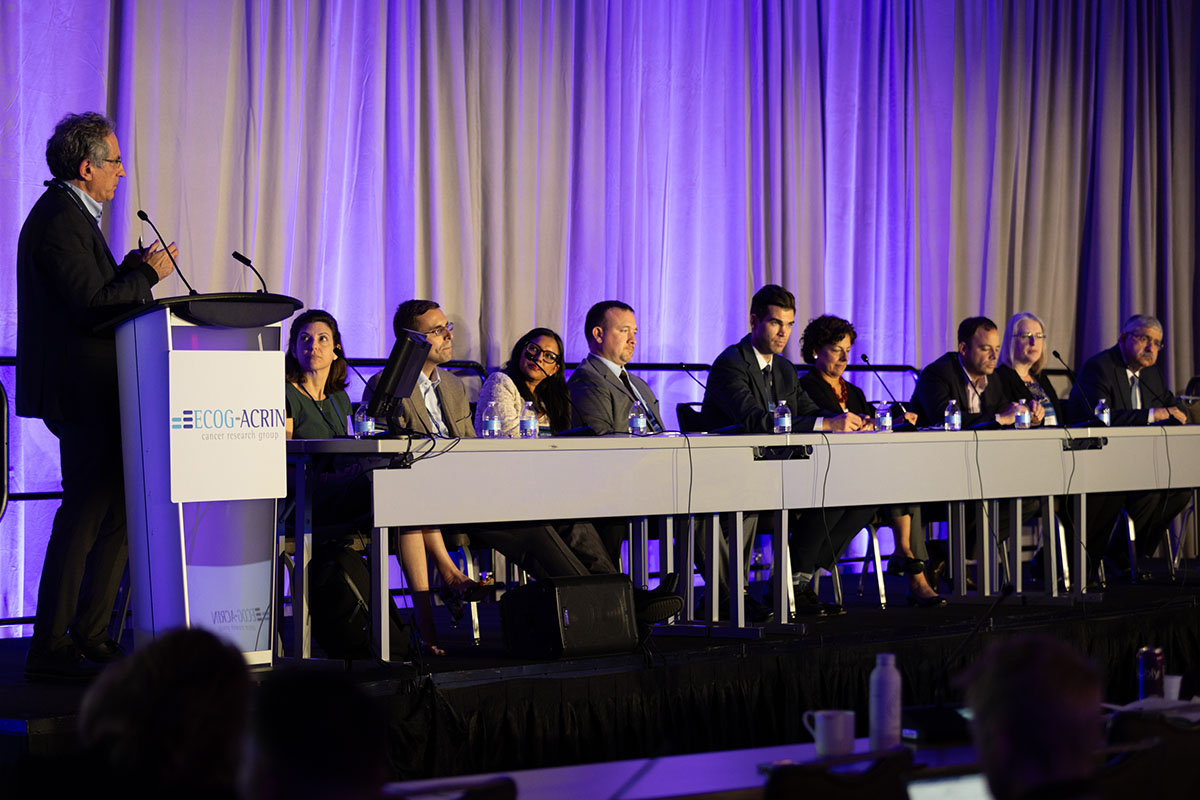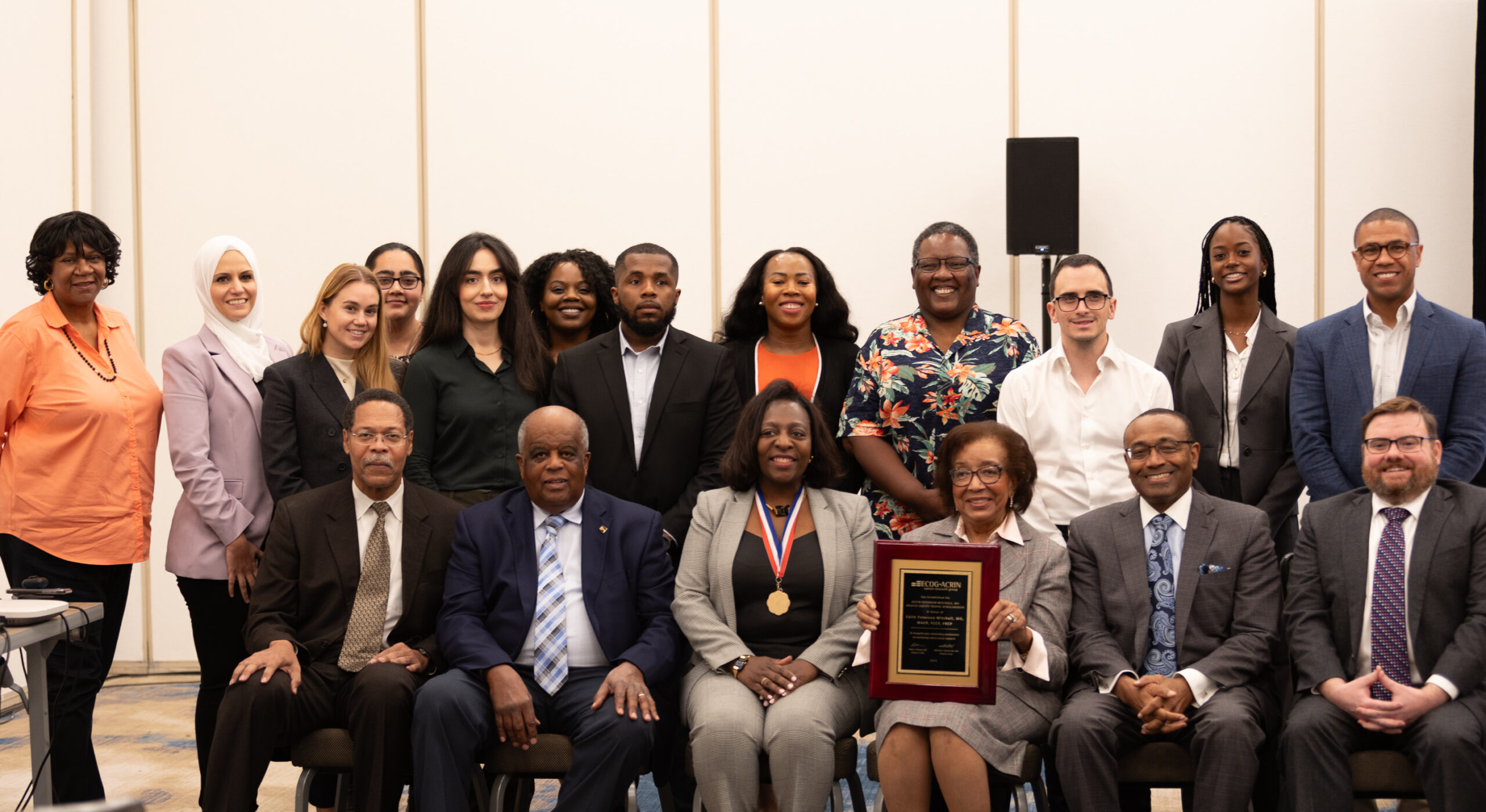
Opportunity Knocks: Harnessing the Skills of Advanced Practice Providers for Cancer Clinical Research
December 19, 2023
Now Enrolling: EA2222/PUMP for Patients With Colorectal Cancer That Has Spread to the Liver
December 19, 2023Highlights from the Fall ECOG-ACRIN Meeting Demonstrate Progress in Research and Inclusivity

The ECOG-ACRIN Cancer Research Group (ECOG-ACRIN) hosted its semi-annual meeting in Washington, DC, from October 25-27, 2023. This was the Group's second in-person-only meeting following the pandemic, and it was well attended, with nearly 830 attendees participating in 60 sessions. The positive impact of direct interactions in promoting idea generation and critique was visible throughout.
 The meeting was notable for a prominent increase in attention to diversity, equity, and inclusion. Fostering representation of underserved groups in clinical trials is a goal that has traction through the award of a Connecting Underrepresented Populations to Clinical Trials (CUSP2CT) grant to Dr. Melissa Simon (Northwestern University). This meeting hosted the largest-ever number of medical and research trainees, with 16 individuals (pictured with ECOG-ACRIN and National Medical Association leadership) attending through the Edith Peterson Mitchell, MD Travel Scholarship Program, aimed at enhancing the minority research workforce. The goals of the Health Equity Committee are being realized through a stated mission to weave inclusion into the fabric of ECOG-ACRIN.
The meeting was notable for a prominent increase in attention to diversity, equity, and inclusion. Fostering representation of underserved groups in clinical trials is a goal that has traction through the award of a Connecting Underrepresented Populations to Clinical Trials (CUSP2CT) grant to Dr. Melissa Simon (Northwestern University). This meeting hosted the largest-ever number of medical and research trainees, with 16 individuals (pictured with ECOG-ACRIN and National Medical Association leadership) attending through the Edith Peterson Mitchell, MD Travel Scholarship Program, aimed at enhancing the minority research workforce. The goals of the Health Equity Committee are being realized through a stated mission to weave inclusion into the fabric of ECOG-ACRIN.
Jennifer Grandis, MD (American Cancer Society and University of California, San Francisco) delivered the keynote address at the session for the Task Force on Advancement for Women. Dr. Grandis spoke on Building and Sustaining Careers: A Gender Equity Lens. Her talk was followed by a Q&A session moderated by Task Force Chair Barbara A. Burtness, MD (Yale University). The work of these committees and working groups reinforces ECOG-ACRIN's commitment to promoting equity in American medicine and health. The spectrum of avenues through which these efforts can impact the future of cancer research is exciting to consider.
Yolanda Lawson, MD, president of the National Medical Association (NMA), addressed members of the Joint ECOG-ACRIN-National Medical Association Panel. This collaboration, which has been in place for many years, enhances the participation of historically underserved individuals in ECOG-ACRIN's clinical trials. William McDade, MD, PhD, chief diversity, equity, and inclusion officer for the Accreditation Council for Graduate Medical Education, described the current climate of medical education and cancer specialty care in the U.S. following the recent Supreme Court ruling on graduate medical education. Randall C. Morgan Jr., MD, MBA, president and CEO of The W. Montague Cobb/NMA Health Institute, presented new opportunities for cancer research through the All of Us Researcher Workbench and several other programs.
Coupled with inclusion, the patient voice is expressed especially by members of the Cancer Research Advocates Committee (CRAC), chaired by Mary Lou Smith, JD, MBA (Research Advocacy Network). In an informal but animated dialogue at the CRAC session, Group Co-Chair Peter J. O'Dwyer, MD, stressed the importance of advocates providing candid evaluation of studies early in clinical trial development. Much as peer review works, the patient's voice in assessing the impact and feasibility of trial ideas is essential to successful implementation. This aspect of the committee's work is a high priority for ECOG-ACRIN. To that end, there is a focus on developing metrics to identify successful approaches.
The meeting was also exceptional in its emphasis on ECOG-ACRIN's unique scientific capabilities—especially its contributions of biomarker-driven cancer treatment and diagnostic trials to the National Cancer Institute's research programs. Many sessions focused on integrating therapeutic and medical imaging research with the latest bioinformatic technologies.
"There was a great spirit of innovation that spanned from unique approaches to designing and analyzing trials using real-world data, to the novel application of precision approaches, and to treatment optimization," said Group Co-Chair Mitchell D. Schnall, MD, PhD.
The two principal plenary sessions at ECOG-ACRIN's Group Meetings are the Robert L. Comis, MD Translational Science Symposium and the General Session. The overall goal of the Comis Symposium is to honor the Group's late leader, Dr. Bob Comis, by seeding ideas for ECOG-ACRIN's various scientific committees to explore within and across its scientific programs. Each Comis symposium offers a focused examination of a particular field of scientific opportunity.
This year's theme was Therapy Optimization. Dr. Schnall introduced the topic as a modern precision medicine approach to cancer therapy that involves combining two clinical approaches. First, an array of treatments is available from which to choose and optimize for each patient (e.g., by dose, dosing interval, treatment duration, treatment combinations, and more). Second, the proper diagnostic information is on hand to guide optimization decisions.
 Other Comis Symposium speakers focused on genomic and imaging biomarkers that have the potential to individualize all the aspects of a patient's treatment. Of note, Harpreet Singh, MD (U.S. Food and Drug Administration [FDA], pictured) outlined some of the unanswered questions that surround the incorporation of such biomarkers in clinical trials. David A. Mankoff, MD, PhD (University of Pennsylvania) moderated a panel discussion. At the symposium's conclusion, the contributions of both the FDA and Friends of Cancer Research were recognized, particularly for their role in helping define study priorities going forward.
Other Comis Symposium speakers focused on genomic and imaging biomarkers that have the potential to individualize all the aspects of a patient's treatment. Of note, Harpreet Singh, MD (U.S. Food and Drug Administration [FDA], pictured) outlined some of the unanswered questions that surround the incorporation of such biomarkers in clinical trials. David A. Mankoff, MD, PhD (University of Pennsylvania) moderated a panel discussion. At the symposium's conclusion, the contributions of both the FDA and Friends of Cancer Research were recognized, particularly for their role in helping define study priorities going forward.
The General Session called attention to #Pinktober and Breast Cancer Awareness Month with three presentations. Christopher E. Comstock, MD (Memorial Sloan Kettering Cancer Center) discussed a Comparison of Abbreviated Breast MRI and Digital Breast Tomosynthesis MRI in Breast Cancer Screening in Women with Dense Breasts. ECOG-ACRIN Breast Cancer Committee Co-Chair Angela M. DeMichele, MD, MSCE (University of Pennsylvania and the Abramson Cancer Center) presented Challenges and Opportunities to Intercept Molecular Relapse in Breast Cancer. Dr. Schnall highlighted the success of the ongoing Tomosynthesis Mammographic Imaging Screening Trial (TMIST).
The second General Session theme was that of Real-World Data (RWD). Donna R. Rivera, PharmD, MSc (FDA), presented Pragmatic Evidence Generation: An FDA Oncology Perspective. ECOG-ACRIN Group Vice Chair Al B. Benson III, MD, spoke about new real-world data opportunities the Group will pursue through a recent FDA award. Michael A. Thompson, MD, PhD (Tempus) provided lessons for therapeutic research from the COVID-19 pandemic when innovative RWD approaches were developed to optimize the management of patients with cancer.
Meeting attendees represented ECOG-ACRIN's scientific community of researchers in cancer biology, immunology, therapeutics, molecular and imaging diagnostics, comparative effectiveness, and patient-reported outcomes, as well as cancer research advocates and experts in bioinformatics and biostatistics. The conference was a venue for specific groups of investigators and advocates to contribute to trial development and implementation. Group science emanates from integral, interrelated interactions across all these entities.
![ECOG-ACRIN logo[19516]275×75](https://blog-ecog-acrin.org/wp-content/uploads/2021/03/ECOG-ACRIN-logo19516275x75.png)
